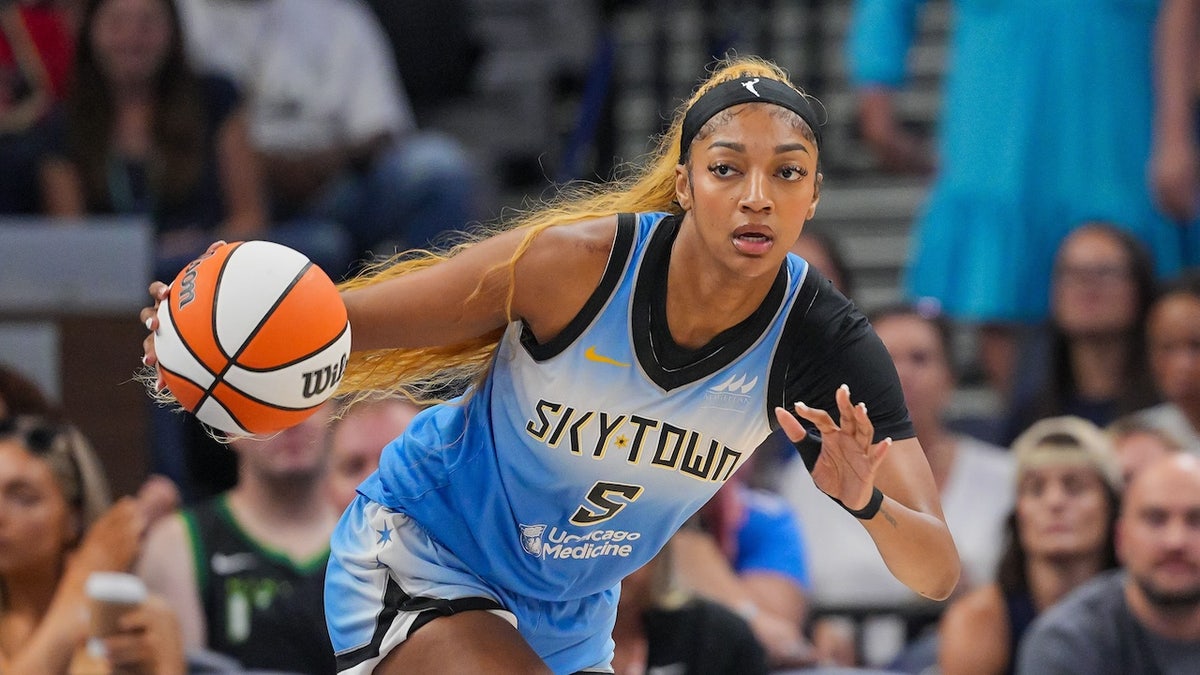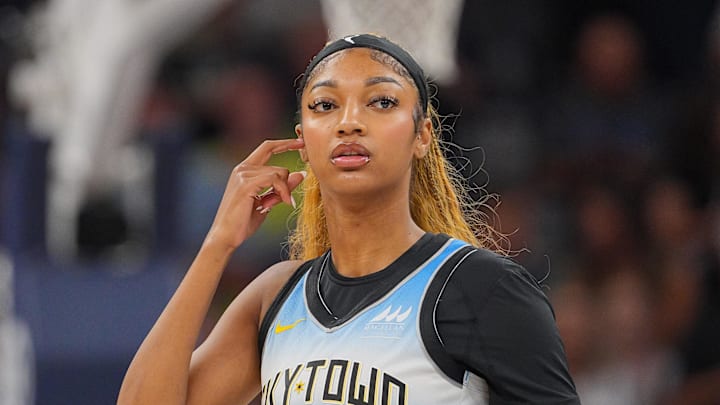In a league already at the crossroads of competition, culture, and identity, Angel Reese — one of the WNBA’s brightest and most outspoken stars — has ignited a national firestorm.
In a bold, emotionally charged interview that aired last week, the Chicago Sky forward declared that the league must “protect, not dilute” the legacy built by Black women — a statement that instantly reverberated through locker rooms, front offices, and living rooms across America.
Her message was clear, but its impact has been anything but simple.

Within days, reports surfaced that the WNBA had cut ties with several players deemed “culturally inconsistent” with the league’s values, a move insiders say was directly influenced by Reese’s comments. What began as a conversation about identity and representation has now spiraled into one of the most divisive moments in modern sports — a collision of pride, progress, and politics that no one saw coming.
“PROTECT, NOT DILUTE” — THE MOMENT THAT STARTED IT ALL
It began during an interview on the podcast Unapologetically Hers, where Reese spoke candidly about the cultural tension she says has long existed inside women’s basketball.
Her tone was fiery, her words deliberate.
“This league was built by Black women — on their strength, their style, their soul,” she said. “We’re the reason this game has swagger, emotion, and life. And if the WNBA doesn’t protect that — if it keeps watering us down to make everyone comfortable — then what are we even doing?”
She leaned forward, looked straight into the camera, and delivered the line that would dominate headlines for the next week:
“We don’t need to fit in. We need to stand out. Protect the culture — or lose the league.”
Within minutes, the clip went viral. Sports pages, cultural blogs, and political commentators all rushed to dissect her words. Supporters called her a truth-teller. Critics accused her of division.
The phrase “Preserve Black Culture” became both a rallying cry and a lightning rod.
THE FALLOUT — A LEAGUE IN CRISIS MODE
Behind the scenes, sources say the WNBA’s top executives immediately began damage control. According to internal reports leaked to The Athletic, several players and staff members had privately complained that Reese’s comments “crossed a line” — while others applauded her courage for finally saying what “everyone had been afraid to admit.”
Then came the shock.

Just three days later, a memo circulated among team representatives announced that the league would be “reevaluating partnerships and player representation to ensure cultural alignment.”
That phrase — “cultural alignment” — sent the sports world into chaos.
By the end of the week, at least two unnamed players had reportedly been released or had their contracts quietly terminated. While the WNBA did not publicly confirm whether those decisions were related to Reese’s remarks, insiders say the timing was “no coincidence.”
“It’s clear that her comments forced the league to take a hard look at itself,” said sports journalist Renee Maxwell. “The question now is whether that reflection leads to growth — or fractures.”
“A MOVEMENT, NOT A MOMENT”
While critics painted her as divisive, Reese doubled down. In a follow-up post on social media, she wrote:
“This isn’t about hate. It’s about home. Black women built this league — and we’re not going to let our culture be erased to make sponsors comfortable.”
She ended the message with three words that instantly became a viral slogan: #ProtectTheCulture.
The hashtag trended for three consecutive days, with supporters flooding timelines with clips of legendary Black players — from Sheryl Swoopes and Lisa Leslie to Candace Parker and A’ja Wilson — celebrating the influence of Black women on the game.
Former WNBA star Cappie Pondexter posted a heartfelt message of support:
“Angel’s right. We gave this league its heartbeat. Don’t let anyone rewrite that history.”
But not everyone agreed.
ESPN analyst Rebecca Lobo cautioned that Reese’s comments “risk alienating players who see the WNBA as a unifying space, not a cultural battleground.”
“Basketball should be inclusive,” Lobo said on-air. “You can celebrate heritage without creating division.”
THE COUNTRY DIVIDES — AND DEBATES
What might have been a niche sports controversy quickly became a full-blown national debate.
Political commentators from both sides weighed in. Conservative outlets accused Reese of promoting “identity politics” in sports, while progressive voices framed her as “the latest athlete to speak uncomfortable truth to power.”
Fox News host Pete Hegseth blasted the WNBA’s internal response as “corporate cowardice wrapped in activism,” arguing that “no athlete should dictate who stays or goes based on cultural allegiance.”
On the opposite side, Congresswoman Cori Bush praised Reese as “a voice for authenticity in a world obsessed with assimilation.”
“She’s not dividing the game,” Bush said on social media. “She’s defending the people who made it possible.”
Even outside politics, entertainers joined the conversation. Rapper Lil Wayne tweeted, “Angel Reese said what every Black artist, athlete, and creative knows — they love our culture, but not our people.”
INSIDE THE WNBA’S STRUGGLE
The WNBA’s internal struggle reflects a tension that’s existed since the league’s founding in 1996 — between mainstream marketability and authentic representation.
While over 70% of WNBA players are Black, league marketing has often centered on a smaller handful of “media-friendly” faces — a dynamic many Black athletes have privately criticized for years.
“It’s the unspoken truth,” one veteran player told Sports Illustrated anonymously. “They want the culture — the fashion, the energy, the sound — but not the politics or the pain behind it.”
League commissioner Cathy Engelbert issued a carefully worded statement following the uproar:
“The WNBA celebrates diversity in every form. Our goal is to create an environment where all athletes — of every background — can thrive.”
But for many, the statement felt evasive.
“You can’t say you celebrate culture while trying to sanitize it,” one former coach wrote on social media. “Angel Reese didn’t divide the league — she exposed the cracks.”
THE PERSONAL SIDE OF THE FIRESTORM
For Reese, this isn’t just a soundbite or a branding play — it’s personal.
The 22-year-old star, known as “Bayou Barbie” since her LSU days, has built a reputation as both a fashion icon and a fierce competitor. She’s outspoken, confident, and unapologetically herself — qualities that have made her one of the WNBA’s most marketable stars, but also one of its most polarizing.
“I’m not here to fit into anyone’s box,” she said earlier this year. “I’m here to break it.”
Close friends say the backlash has been emotionally draining but not surprising. “Angel knew this would blow up,” said one teammate. “She just didn’t expect it to get this big this fast.”
A SPORT AT A CROSSROADS
Now, the WNBA finds itself facing an existential question: Can a league built on diversity survive its own cultural reckoning?
Attendance and viewership have risen dramatically in recent years, thanks to new stars like Reese, Caitlin Clark, and Sabrina Ionescu. But the league’s growing popularity has also brought new scrutiny — and new divisions.

Sports sociologist Dr. Alicia Green believes this moment could define the league’s future.
“Every generation faces a turning point,” she said. “The NBA had its civil rights era. The NFL had Colin Kaepernick. For the WNBA, this might be it — the moment it decides what it truly stands for.”
“PRESERVE BLACK CULTURE” — A LEGACY IN MOTION
Despite the controversy, Reese’s influence is undeniable. Her interviews have sparked conversations not just about race, but about authenticity — what it means to stay true to the roots of a sport that has always been intertwined with culture.
“You don’t have to agree with her,” wrote journalist Brittany Renner. “But you can’t ignore her. Angel Reese just forced America to look at the uncomfortable truth — that even progress can come with erasure.”
As the dust begins to settle, one image from that now-iconic interview continues to circulate online: Reese sitting upright, fierce but vulnerable, staring into the lens as if daring the world to look away.
And beneath that image, one caption keeps appearing — reposted, retweeted, rewritten by thousands who see in her words something bigger than basketball:
“Protect the culture. Because if we lose that, we lose everything.”